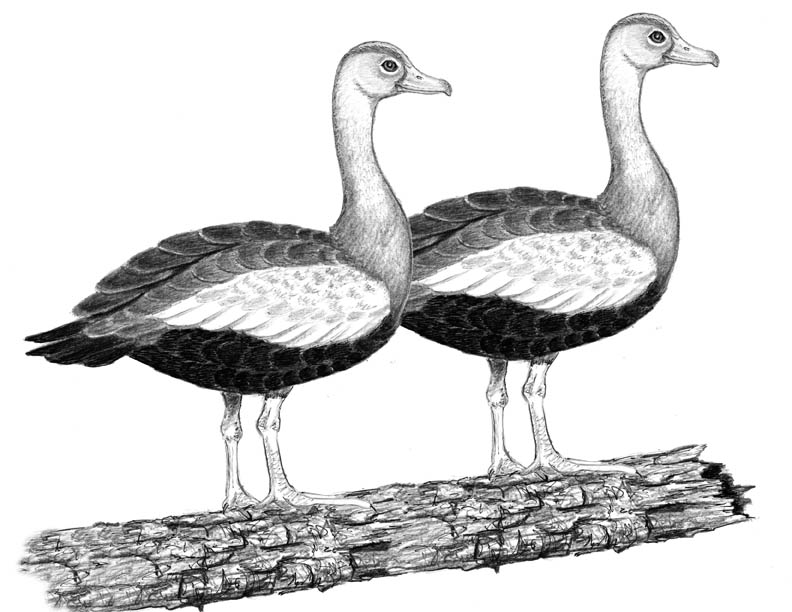
Dear Bird Folks,
I was looking in my bird book last night and saw a bird called a “Black-bellied Whistling Duck.” That got me wondering, how can a duck whistle when it doesn’t have any lips?
– Al, Brewster, MA
You are right, Al,
You are totally right about ducks not having lips. That is exactly why they can’t whistle, drink from straws, blow out the candles on a birthday cake or make out in the backseat of a ’57 Chevy. But nature has a way of providing special features for certain creatures. Woodpeckers have chisel beaks for digging into trees, swallows have extra-large mouths for scooping up insects and whistling-ducks have two elongated toes on their right foot, which allows them to whistle. How, you ask? The birds put their two long toes in their mouth and blow hard. Doing this produces a loud whistle. It’s the same way some humans whistle for their dog, only humans use two fingers to whistle and not their toes. (Although, I have a cousin in Worcester who can do it either way. I try to avoid him.)
What’s the old adage, ask a silly question and you’ll get a silly answer? I’m pretty sure, Al, your question was meant to be a goof, as was my answer. (Except for that part about my cousin. That’s true.) But the joke is on you. Now you have to read an entire column on Black-bellied Whistling Ducks. Ha, ha! But don’t complain. It could be worse. You could be reading another story about that peculiar Manti Te’o guy, the football player with an imaginary girlfriend. What’s going on there? I don’t think there’ll be many trips to the backseat of a ’57 Chevy for that dude.
Just to be clear, Black-bellied Whistling Ducks are real ducks, but they don’t have extra-long toes. Although they do have an extra-long name. Just look at it. “Black-bellied Whistling Duck” nearly takes up an entire line. All I have to do is write it four or five times and half the column is done. I’m starting to like this bird.
Black-bellied Whistling Ducks are mainly found in South America, Central America and Mexico, but quite a few also breed in Texas, Louisiana and southern Florida. And even though they are ducks, some of their qualities are more swan or goose-like. For example, both sexes look the same. That’s not how ducks typically like to do things. Most ducks prefer to have the males and females look distinctly different. If you look at old wedding pictures of, say, Mallards, teal, mergansers, eiders or buffleheads, you’ll see what I mean. But swan, geese and whistling-duck couples are mirror images of each other. In addition, ducks normally pick a new mate each year. But swan, geese and whistling-duck relationships tend to be permanent. Since they all look the same, there is little point in making a new selection.
Falling in love with an identical mate may make whistling-ducks appear to be a little narcissistic, but I can’t blame them. They are very handsome birds. Besides their black bellies, they have red bills, chestnut bodies, elongated necks and extra-long Rockette-ish legs. Unfortunately, the call, or the “whistle,” of a whistling-duck isn’t anything to brag about. Instead of having a musical quality, the birds give off a high-pitched squeal, sounding like a cheap dog toy…that you wish you had never bought.
Here’s a fun fact. The “whistling” part of this duck’s name is actually fairly new. Because of their tendency to nest in trees, there was a time when these birds were called “Black-bellied Tree Ducks.” A few years ago I was birding in a marsh down south when some old timer started yelling that he had spotted a flock of “tree ducks.” Everyone else in the area was confused because no one knew what the heck tree ducks were. Okay, fine. The old guy was me. I have trouble with the new-fangled names. What do you expect from someone who went to school so long ago that it had a cloakroom?
In some areas of their range over-hunting has caused a drop in the population of Black-bellied Whistling Ducks. Regrettably, whistling-ducks aren’t wary of people and that’s not a good thing, especially when they run across folks who like to shoot birds for fun. But there is some good news. In some parts of the U.S. the number of whistling-ducks appears to be increasing, especially in areas where the birds have taken advantage of man-made nest boxes. Yea!
That’s it, Al. That’s all I’m writing about Black-bellied Whistling Ducks and their ability to whistle without lips. But if you think your question was weird, here’s an even stranger question someone else sent me. (I swear I’m not making this up.) The question is: If a person went outside with his or her mouth open, how long would he/she have to wait until bird poop landed in it? (Suddenly, the duck lip question doesn’t seem so ridiculous.) According to the website What if.xkcd.com, it would take 195 years for the poop package to be delivered. How did they arrive at this number? They factored in the number of birds in the world (300 billion), the surface of the earth (whatever that is) and the size of the typical person’s mouth (aka, piehole). They then used some crazy formula and came up with 195 years. Of course, all these numbers are only averages, especially the mouth size. I’m sure if I went outside with my mouth open I’d probably only have to wait about fifteen minutes.